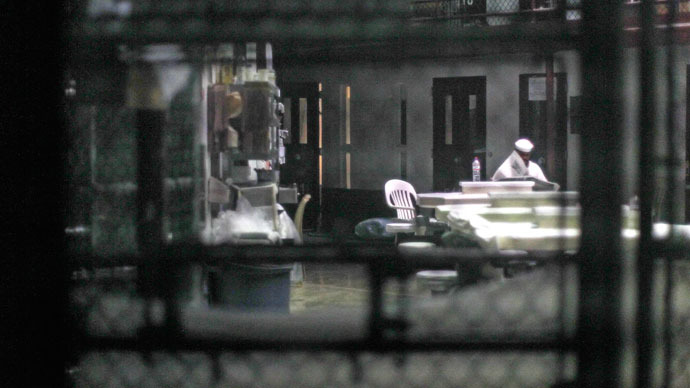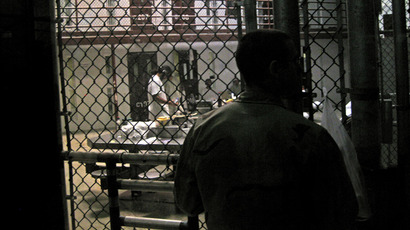UN calls force-feeding at Guantanamo 'torture'

The UN human rights office has condemned force-feeding hunger strikers at Guantanamo Bay, calling it ‘torture’ and a breach of international law. At least 21 inmates out of the 100 officially on strike are being force-fed through nasal tubes.
Follow RT’s day-by-day timeline of the Gitmo hunger strike.
"If it's perceived as torture or inhuman treatment -- and it's the case, it's painful -- then it is prohibited by international law," said Rupert Coville, spokesman for the UN high commissioner for human rights, AFP reported.
The UN bases its position on that of the World Medical Association, which consists of 102 nations including the United States, Coville explained. The international organization, a watchdog for ethics in healthcare, said back in 1991 that forcible feeding is "a form of inhuman treatment" and “never ethnically acceptable.”
"Even if intended to benefit, feeding accompanied with threats, coercion, force or use of physical restraints is a form of inhuman and degrading treatment. Equally unacceptable is the force feeding of some detainees in order to intimidate or coerce other hunger strikers to stop fasting," it said.
According to the WMA’s 1975 declaration, artificial feeding methods should never be used without a prisoner's permission.
The prisoner has the right to refuse food if a physician considered the person able to rationally take the decision, being aware of the consequences. If the person is unable to take the decision or agrees to the feeding then it can be used, says the WMA.
A lawyer representing one of the detainees at Guantanamo detention camp, a Kuwaiti Fayiz al-Kandari, 35, claims that his client has been tube-fed against his will for a week, accusing US military personnel of using an “unnecessarily large feeding tube.”
Another prisoner described the process as extremely painful in a New York Times op-ed on Monday, April 15.
"There was agony in my chest, throat and stomach," Samir Naji al Hasan Moqbel wrote.
"I had never experienced such pain before. I would not wish this cruel punishment upon anyone."

Cindy Pánuco, a lawyer representing one of those on hunger strike has spoken to RT, saying that she does see a possible way out of the ongoing stand-off. She believes that no one has the right to take control of a person’s body against their will, imploring authorities to take note of the detainees complaints.
“This problem could be resolved with something as simple as meeting with and talking to the prisoners and discussing what it will take to end the hunger strike and it’s as simple as allowing them to return their Korans or to not have the Korans searched – they haven’t been a security threat for many years.” The hunger strike at the Guantanamo Bay jail, US naval base in southeastern Cuba, is now into its 12th week, with 100 inmates officially out of 166 refusing all food. Lawyers for several of the detainees say that the number of hunger strikers is actually higher than official estimates, raising the number to 130.
Twenty-one of the detainees fasting are being force fed through nasal tube due to their deteriorating health and five hospitalized, according to official estimates as of April 29.
On Wednesday President Barack Obama announced that he is
considering hiring a new State Department official to oversee
options for a future transfer of the prison’s detainees once it
closes.
White House spokesman Jay Carney said “One of the options available
to us that we're examining is reappointing a senior official at the
State Department to renew our focus again on repatriating or
transferring detainees that we determine can be returned to their
home countries or third countries."
Although he admitted that the president’s hands are tied without
congressional support. Adding to concerns many in Congress continue
to oppose the closure.
Earlier in the year, the previous State Department official in
charge of the process was reassigned and to date has not been
replaced.
The fresh measure followed an address on Tuesday – the
president’s first public response since the start of
the hunger strike - where he again urged Congress to get onboard
with him in closing the facility. This is essentially a renewal of
his earlier 2008 presidential campaign pledge that promised to shut
Guantanamo down in 2009.
While the inmates are protesting their indefinite incarceration
without being presented charges, Obama said that the prosecution of
terrorists should be getting “wiser.”
The Guantanamo Bay facility was set up by former president
George W. Bush to hold those allegedly responsible for the
September 11, 2001, terrorist attacks. However, the detainees
accused of terrorism still remain in prison without trial. Only
nine have been formally charged or convicted of a criminal
offense.














